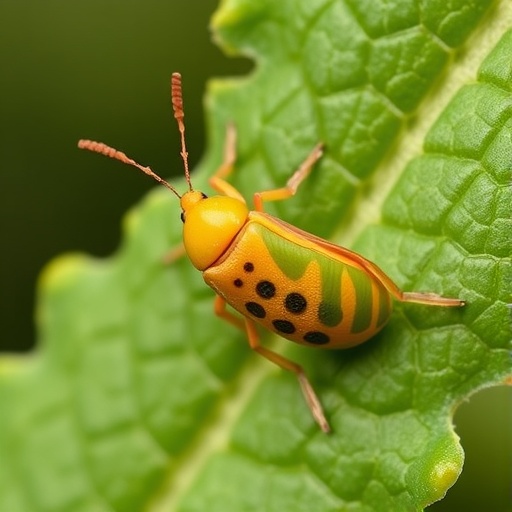In a groundbreaking study led by researchers Whitehead, Karley, and Darby, new genomic insights into the clonal diversity of UK populations of the potato aphid, Macrosiphum euphorbiae, have emerged, providing crucial information to both agricultural scientists and pest management professionals. This research has the potential to reshape our understanding of how these notorious pests adapt to their environments and selected insecticides. The findings are being published in the journal BMC Genomics, which emphasizes the increasing intersection of genomic technologies and agricultural practices.
The potato aphid is not just any pest; it is a significant agricultural threat, particularly to potato crops. Their ability to reproduce asexually means a single individual can lead to a rapid proliferation of populations under favorable conditions. The studies outlined in this article shed light on the genetic diversity among clonal populations of this species existing in the United Kingdom. The implications of such diversity can affect everything from the effectiveness of pest control strategies to understanding the ecological role of the aphids themselves.
By employing advanced genomic sequencing techniques, the researchers uncovered the underlying genetic variations among the aphids. They discovered that genetic diversity is not uniform across different clonal lineages, contradicting the earlier assumptions that clonal populations lacked genetic variability. This genetic mosaic could play a critical role in how these pests withstand environmental stresses and respond to chemical controls. Such knowledge is invaluable given the global trend of increasing insecticide resistance.
The implications go even further, as it highlights the potential of vertical gene transfer. This phenomenon could allow aphids to acquire beneficial traits from surrounding populations, paving the way for rapid evolutionary changes. Understanding these genetic dynamics offers critical insights into potential future challenges in pest management. Knowing that resistance traits can more readily spread among populations could force a re-evaluation of insecticide use strategies.
Another key finding of the study is the geographic distribution of clonal diversity among potato aphids in the UK. The researchers documented significant variations in genetic profiles depending on the regions from which the aphids were sampled. This suggests that local environmental conditions and agricultural practices could shape the genetic landscape of these populations. Such findings advocate for region-specific management tactics that account for local diversity rather than a one-size-fits-all approach.
Collaboration with local farmers allowed the researchers to augment their understanding of aphid population dynamics. Engaging with agricultural communities is essential for effective pest management, as farmers often provide insights into pest outbreaks and behaviors that can inform scientific research. This partnership also fosters a feedback loop where farmers can adapt strategies based on the latest scientific findings, highlighting the need for interdisciplinary approaches in addressing agricultural challenges.
In terms of implications for crop productivity, the study could influence how potato crops are bred and managed. As genomic insights reveal more about pest resilience and adaptability, plant breeders might prioritize certain traits to enhance crop resistance against these pests. Crop resilience is a pressing issue, especially considering the increasing climate variability that affects pest populations and consequently crop yields.
Moreover, the researchers emphasized the role future genomic tools can play in ongoing aphid studies. The integration of machine learning algorithms with genomic data opens a new frontier in monitoring aphid populations, predicting outbreaks, and even designing bespoke pest control interventions. As we move deeper into the era of precise agricultural technologies, such insights could help mitigate the impacts of pest infestations more effectively.
In summary, the research spearheaded by Whitehead, Karley, and Darby illustrates the profound impacts of genomic diversity on pest management strategies. By unraveling the complexities of clonal diversity in potato aphids, the study not only enhances our understanding of these pests but also sets the stage for more sustainable agricultural practices that prioritize both crop health and environmental stewardship. The future of pest management may well depend on how effectively we harness such genomic insights in practical applications.
As this research paves the way for future studies, it also opens the door for scientists to explore additional facets of pest biology that have remained enigmatic. Examining genetic diversity in other agricultural pests could yield similar insights and lead to an even broader understanding of pest resilience and adaptability. The ongoing challenge will be to balance research advances with practical, actionable outcomes for farmers on the ground.
In turning the spotlight on Macrosiphum euphorbiae, we uncover a microcosm of ecological interactions, resilience, and adaptation. The genomic landscape is a canvas upon which the interplay between environment and evolution is painted. These findings serve as a reminder that in biodiversity lies strength, and understanding this complexity is key to ensuring food security in an uncertain future.
Lastly, as the publication of these findings ignites interest, the agricultural community waits eagerly for insights that could redefine pest management practices. The ongoing dialogue between researchers and practitioners will be crucial in translating these genomic revelations into real-world solutions, fostering a resilient agricultural ecosystem that stands resilient against future challenges.
Subject of Research: Clonal diversity in UK populations of the potato aphid, Macrosiphum euphorbiae.
Article Title: Genomic insights into clonal diversity in UK populations of the potato aphid, Macrosiphum euphorbiae.
Article References:
Whitehead, M., Karley, A. & Darby, A. Genomic insights into clonal diversity in UK populations of the potato aphid, Macrosiphum euphorbiae.
BMC Genomics 26, 1025 (2025). https://doi.org/10.1186/s12864-025-12152-1
Image Credits: AI Generated
DOI: https://doi.org/10.1186/s12864-025-12152-1
Keywords: Macrosiphum euphorbiae, clonal diversity, genomics, pest management, agricultural practices.




